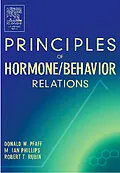* Uniform presentation of material across all chapter, with each chapter addressing a key principle, illustrated by basic experimental and clinical examples
* Includes user-friendly features such as boxed figures with extended captions and references, numerous clinical notes, and a comprehensive list of abbreviations
* Illustrations highlight both the clinical and basic science information
Autorentext
Donald W. Pfaff heads the Laboratory of Neurobiology and Behavior at The Rockefeller University. He received his scientific training at Harvard College and MIT. He is a Member of the U.S. National Academy of Sciences and a Fellow of the American Academy of Arts and Sciences. Pfaff's laboratory focuses on steroid hormones and brain function, genes influencing neuronal functions, and generalized CNS arousal. He is the author or coauthor of over 10 books and more than 900 research publications.
Inhalt
Section I.
Characterizing the Phenomena: Hormone Effects are Strong and Reliable
Section II.
History: Hormone Effects can Depend on Family, Gender, and Development
Section III.
Time: Hormonal Effects on Behavior Depend on Temporal Parameters
Section IV.
Space: Spatial Aspects of Hormone Administration and Impact are Important
Section V.
Mechanisms: Molecular and Biophysical Mechanisms of Hormone Actions Give Clues to Future Therapeutic Strategies
Section VI.
Environment: Environmental Variables Influence Hormone/Behavior Relations
Section VII.
Evolution
